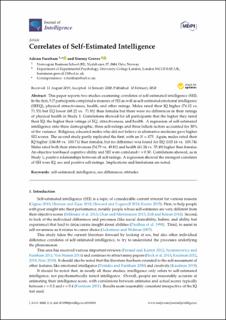Correlates of Self-Estimated Intelligence
Journal article, Peer reviewed
Published version
Permanent lenke
https://hdl.handle.net/11250/2761853Utgivelsesdato
2020Metadata
Vis full innførselSamlinger
- Scientific articles [2181]
Sammendrag
This paper reports two studies examining correlates of self-estimated intelligence (SEI). In the first, 517 participants completed a measure of SEI as well as self-estimated emotional intelligence (SEEQ), physical attractiveness, health, and other ratings. Males rated their IQ higher (74.12 vs. 71.55) but EQ lower (68.22 vs. 71.81) than females but there were no differences in their ratings of physical health in Study 1. Correlations showed for all participants that the higher they rated their IQ, the higher their ratings of EQ, attractiveness, and health. A regression of self-estimated intelligence onto three demographic, three self-ratings and three beliefs factors accounted for 30% of the variance. Religious, educated males who did not believe in alternative medicine gave higher SEI scores. The second study partly replicated the first, with an N = 475. Again, males rated their IQ higher (106.88 vs. 100.71) than females, but no difference was found for EQ (103.16 vs. 103.74). Males rated both their attractiveness (54.79 vs. 49.81) and health (61.24 vs. 55.49) higher than females. An objective test-based cognitive ability and SEI were correlated r = 0.30. Correlations showed, as in Study 1, positive relationships between all self-ratings. A regression showed the strongest correlates of SEI were IQ, sex and positive self-ratings. Implications and limitations are noted.

